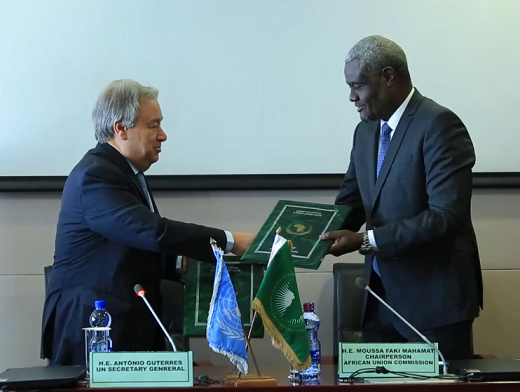
U.N., A.U. welcome ECOWAS’ sanctions on Guinea-Bissau leaders

The United Nations and the African Union on Thursday welcomed a move by the Economic Community of West African States (ECOWAS) to sanction about 20 politicians and businessmen accused of undermining efforts to resolve a prolonged political crisis in Guinea Bissau.
In a joint press statement issued by U.N. Secretary General Antonio Guterres and A.U. Commission chairperson Moussa Faki Mahamat, the two bodies said they “fully endorse the recent decisions on Guinea-Bissau taken by the Authority of Heads of State and Government of the Economic Community of West African States (ECOWAS) on the margins of the African Union Summit in Addis Ababa.”
ECOWAS’ decision came on the back of the appointment of Augusto Antonio Artur da Silva to the post of prime minister late last month by President Jose Mario Vaz, which it said was a violation of a 2016 ECOWAS-brokered deal.
Among those targeted by the sanctions were members of Vaz’s parliamentary faction as well has his son, Emerson Goudiaby Vaz.
For over two years, Vaz has been embroiled in a bitter dispute within his own ruling African Party of the Independence of Guinea and Cape Verde (PAIGC) that has hobbled the government.
The impasse has sparked regular protest marches and raised fears of instability that diplomats fear could be exploited by drug traffickers, who have long used the turbulent nation as a transit point for shipments between South America and Europe.
The U.N.-A.U. statement said it condemned “the recent actions taken by the national authorities to prevent PAIGC from convening and holding its Party Congress, including the directive given to national security services to evacuate and shutter the party’s headquarters.”
It called on the relevant authorities to strictly adhere to international human rights and humanitarian law and to immediately remove all restrictions on the right to peaceful assembly, political participation and freedom of speech.
Guterres and Mahamat also said they were closely following the political developments in Guinea-Bissau, and were in support of ECOWAS’ efforts to ensure a swift resolution of the crisis.






